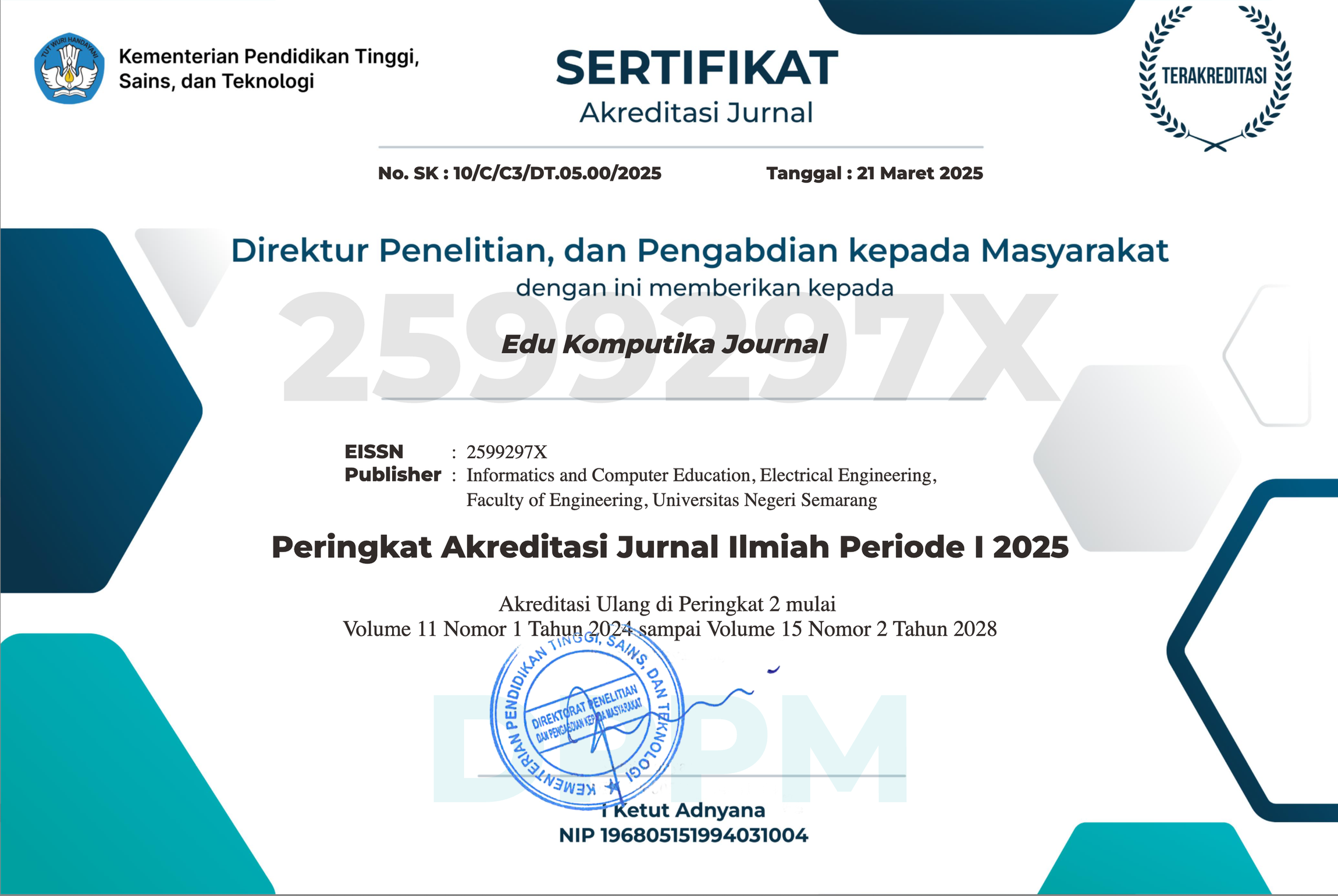Analysis of the Use of the Merdeka Mengajar Platform Using the Hedonic Motivation System Adoption Model
DOI:
https://doi.org/10.15294/edukom.v11i1.10741Keywords:
Hedonic Motivation, HMSAM, Merdeka Mengajar Platform, Teacher PerceptionAbstract
The success of the implementation of the Merdeka Mengajar Platform (PMM) is measured by its acceptance and sustained use by teachers. This study will measure the factors influencing the acceptance and continued use of PMM by 53 teachers as respondents, from four high schools in the Rumbai District of Pekanbaru City, Riau Province, each of whom was given 21 questions. To accomplish this, the Hedonic Motivation System Adoption Model was used, which includes the following variables: Perceived Ease of Use (X1), Perceived Usefulness (X2), Curiosity (X3), Joy (X4), Control (X5), Behavioral Intention to Use (Y1), and Focused Immersion (Y2). Data analysis was conducted using Validity Tests, Reliability Tests, Normality Tests, Linearity Tests, Correlation Tests, Partial Tests, Simultaneous Tests, and Hypothesis Tests. The aspects derived from the use of PMM indicate that the hedonic factors for ease of use (X1) and curiosity (X3) in relation to intention (Y1) have correlation values of 0.560 and 0.661, respectively. Ease of use (X1) has full control over joy (X4) in relation to intention (Y1), with correlation values of 0.560 and 0.657. The factors influencing the success of PMM acceptance are curiosity (X3) and joy (X4). The higher the ease of use combined with curiosity and joy, the stronger the intention to use the application.
References
REFERENCES
Djusar, S., Asril, E., Anggraini, K., & others. (2023). Pemanfaatan Akun Belajar. id bagi Guru SMPN Binaan Khusus Kota Dumai. Wikrama Parahita: Jurnal Pengabdian Masyarakat, 7(1), 111–116.
doi: doi.org/10.30656/jpmwp.v7i1.5400
Djusar, S., Asril, E., Zamsuri, A., & Syam, F. A. (2024). Peningkatan Kompetensi Guru Mata Pelajaran Sekolah Menengah Kejuruan Negeri 3 Bengkalis Dalam Implementasi Kurikulum Merdeka. J-COSCIS: Journal of Computer Science Community Service, 4(1), 92–101.
doi: doi.org/10.31849/jcoscis.v4i1.18575
Hilmin, H., Noviani, D., & Nafisah, A. (2022). Kebijakan pemerintah daerah dalam penerapan kurikulum merdeka. Khatulistiwa: Jurnal Pendidikan Dan Sosial Humaniora, 2(2), 148–162.
doi.org/10.55606/khatulistiwa.v2i2.565
Kemdikbud. (2022). Platform Merdeka Mengajar Dukung Guru Terapkan Kurikulum Merdeka. Retrieved from https://www.kemdikbud.go.id/main/blog/2022/02/platform-merdeka-mengajar-dukung-guru-terapkan-kurikulum-merdeka
Lowry, P. B., Gaskin, J., Twyman, N., Hammer, B., & Roberts, T. (2012). Taking ‘fun and games’ seriously: Proposing the hedonic-motivation system adoption model (HMSAM). Journal of the Association for Information Systems, 14(11), 617–671.
doi: 10.17705/1jais.00347
Mengajar, M. P. M. (2024). Mengenal Platform Merdeka Mengajar. Retrieved from https://pusatinformasi.belajar.id/hc/id/articles/4433405881241-Mengenal-Platform-Merdeka-Mengajar#:~:text=Platform Merdeka Mengajar adalah platform,mengajar%2C belajar%2C dan berkarya.
Nazariana, N., Akmaluddin, A., & Kasmini, L. (2024). Peningkatan Kemampuan Guru dalam Mendukung Penerapan Implementasi Kurikulum Merdeka di SMP Negeri 1 Montasik. Indo-MathEdu Intellectuals Journal, 5(1), 795–806.
doi: doi.org/10.54373/imeij.v5i1.833
Oluwajana, D., Idowu, A., Nat, M., Vanduhe, V., & Fadiya, S. (2019). The adoption of students’ hedonic motivation system model to gamified learning environment. Journal of Theoretical and Applied Electronic Commerce Research, 14(3), 156–167.
doi: doi.org/10.4067/S0718-18762019000300109
Palos-Sanchez, P. R., Saura, J. R., & Velicia-Martin, F. (2024). A case study on a hedonic-motivation system adoption model in a game-based student response system. International Journal of Human--Computer Interaction, 40(3), 701–718.
doi.org/10.1080/10447318.2022.2121801
Rahmawati, S., & Nurachadija, K. (2023). Inovasi Pendidikan Dalam Meningkatkan Strategi Mutu Pendidikan. BERSATU: Jurnal Pendidikan Bhinneka Tunggal Ika, 1(5), 1–12.
doi: doi.org/10.51903/bersatu.v1i5.303
Triloka, J., & others. (2023). Kajian analisis persepsi penerimaan Platform Merdeka Mengajar (PMM) pada guru SMP negeri di Kota Metro dengan menggunakan Technology Acceptance Model (TAM). In Prosiding Seminar Nasional Darmajaya (Vol. 1, pp. 251–258).








